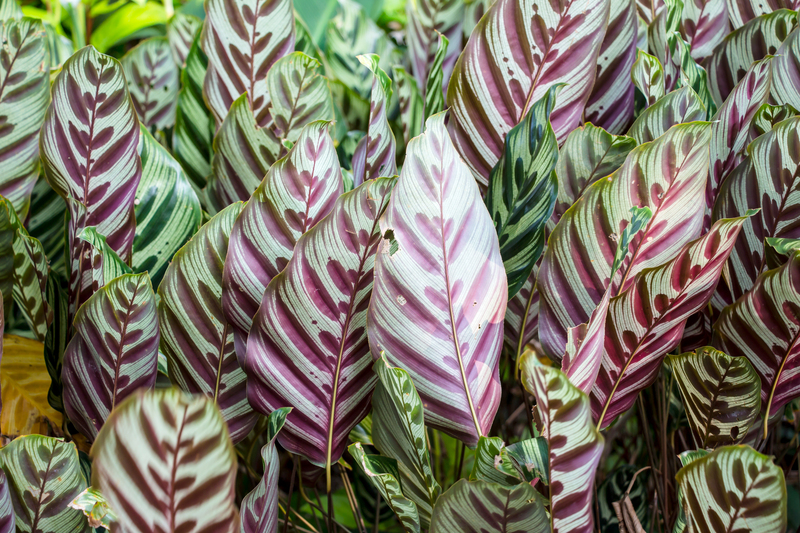Expert orchid care guide for enthusiasts
Posted on 25/08/2025
Expert Orchid Care Guide for Enthusiasts
Welcome to the ultimate resource dedicated to orchid care for hobbyists, collectors, and those passionate about these exquisite plants. Whether you're a beginner wondering how to nurture your first Phalaenopsis or an advanced grower refining your techniques, this comprehensive guide provides the essential knowledge and expert tips you need for beautiful, healthy orchids all year round.
Understanding Orchids: Key Insights for Enthusiasts
Orchids are among the most diverse and fascinating families of flowering plants, captivating gardeners worldwide with their unique beauty and remarkable resilience. However, their care can be challenging without a clear understanding of their specific requirements. This guide covers everything from basic orchid plant care to specialized advice for creating the perfect environment for your blooms.
Why Are Orchids Special?
- Incredible Diversity: Over 25,000 naturally occurring species and more than 100,000 hybrids.
- Long-Lasting Blooms: Many orchids produce flowers lasting several weeks to months when cared for properly.
- Exotic Appearance: Their intricate shapes and vivid colors make them prized in homes, offices, and collections alike.
- Adaptability: Orchids can thrive in various environments, from humid jungles to mountainous regions.
Essential Orchid Care Fundamentals
Every orchid enthusiast, from novice to expert, should know the foundational aspects of orchid plant care. These include understanding the type of orchid you own, its native habitat, and how to recreate those conditions at home for optimal growth and flowering.

Popular Orchid Types and Their Care Needs
There are countless varieties of orchids, but these are the most common among hobbyists, each with specific care requirements:
Phalaenopsis (Moth Orchids)
- Ideal for beginners and popular for their long-lasting blooms
- Prefer indirect light and consistent moisture
- Thrive in household environments with moderate humidity
Cattleya Orchids
- Known for large, fragrant blooms
- Need brighter light and good airflow
- Well-draining potting medium is essential
Dendrobium Orchids
- Wide variety of sizes and bloom types
- Enjoy intermediate to bright light
- Require distinct wet and dry periods for healthy growth
Oncidium Orchids (Dancing Lady Orchids)
- Distinctive, profuse sprays of small flowers
- Need ample sunlight and regular watering
- Best grown in well-ventilated, humid conditions
Miltonia (Pansy Orchids)
- Recognized for their pansy-like faces and sweet scent
- Benefit from cool to intermediate temperatures
- Require evenly moist roots and high humidity
Creating the Perfect Environment: Orchid Care Tips
Light: The Foundation of Orchid Health
Proper lighting is critical for successful orchid growth and blooming. Too much sunlight can scorch leaves, while too little prevents flowering. Expert orchid care involves matching light levels to your orchid's needs:
- Phalaenopsis: Thrive in moderate, indirect sunlight.
- Cattleya, Dendrobium, Oncidium: Prefer brighter, filtered light--ideal near east or west-facing windows.
- Miltonia: Enjoy lower light, mimicking their cloud forest origins.
Tip: If your orchid's leaves turn yellowish-green, they're likely getting enough light. Dark green leaves indicate they need more.
Temperature and Humidity: Keys to Thriving Plants
Many orchids do well at average household temperatures of 18-24?C (65-75?F) during the day and a slight drop at night. However, understanding your specific species' temperature tolerance is essential.
- Warm-growing orchids (e.g., Phalaenopsis): Prefer minimal temperature fluctuation.
- Intermediate to cool-growing orchids (e.g., Miltonia): Require more distinct day/night differences.
Orchids favor humidity levels of 40-70%. Increase humidity by grouping plants together, placing pots on trays of pebbles and water, or using a room humidifier.
Airflow: Preventing Pests and Disease
Stagnant air leads to fungal and bacterial problems in orchids. Strong but gentle air movement--achieved with fans or open windows--keeps foliage dry, reduces pests, and strengthens plants.
Watering Orchids Like an Expert
How Much and How Often?
Overwatering is the most common reason for orchid decline. Expert orchid care focuses on meeting a plant's exact moisture needs:
- Allow the potting media to nearly dry out before rewatering.
- Water thoroughly until it runs from the pot's drainage holes.
- Reduce watering in winter when growth slows.
- Never let orchids sit in water!
The Best Water for Orchids
Most orchids prefer rainwater or distilled water to avoid mineral buildup. If using tap water, allow it to stand overnight to dissipate chlorine.
Orchid Fertilizing Strategy
Regular, dilute feeding encourages robust growth and frequent flowering. Use a balanced orchid fertilizer ("weakly, weekly" is the mantra):
- Dilute to quarter- or half-strength, feeding every second or third watering
- Flush the potting mix with plain water monthly to prevent salt buildup
- Switch to a bloom-boosting formula when flower spikes appear
Repotting and Choosing the Right Orchid Potting Mix
When to Repot Orchids?
Orchids should generally be repotted every 1-3 years or when their potting media breaks down. Telltale signs include:
- Roots growing out of the pot's drainage holes
- Potting media becoming compacted or smelling sour
- Poor drainage leading to root rot
Best Potting Mix for Orchids
Orchids are epiphytes--they grow on trees in nature, not in soil. Use specialty orchid mix, often containing:
- Pine bark or coconut husk chips
- Perlite or pumice for drainage
- Sphagnum moss for moisture retention (especially for young plants)
- Charcoal to deter disease
A well-draining, airy mix is vital--never use traditional potting soil.
Tips for Successful Repotting
- Water the orchid the day before to ease removing it from the old pot
- Trim off dead or rotting roots with sterile scissors
- Gently spread healthy roots and settle into fresh mix
- Wait 7-10 days before resuming fertilizing to allow roots to establish
Encouraging Reblooms and Flower Spike Aftercare
Getting Orchids to Bloom Again
Orchids often need a rest after blooming. Expert orchid care for reblooming focuses on:
- Allowing a short dry or cool period (for certain species) to trigger flower spikes
- Gradually resuming regular watering and feeding
- Monitoring changes in daylight--longer nights in autumn stimulate budding
Flower Spike Care
- Once blooming ends, trim the spent spike above a node to encourage a secondary set of flowers (for Phalaenopsis)
- For other varieties, cut the spike completely at the base to direct energy back to the plant
Post-Flowering Recovery
After blooming, orchids benefit from a brief resting phase with reduced feeding and minimal water--allow roots to nearly dry out between waterings. Older leaves may yellow and drop, but new growth typically follows soon after.
Solved: Common Orchid Care Problems
Preventing and Managing Pests
Orchid pests include aphids, scale, mealybugs, spider mites, and thrips. Prevent infestations by:
- Ensuring strong air circulation
- Inspecting plants regularly (especially under leaves and at the base)
- Washing with insecticidal soap or horticultural oil, if needed
- Isolating new or infested plants
Disease Control for Orchids
Fungal and bacterial issues arise mainly from excess moisture. To avoid:
- Water early in the day so leaves dry by evening
- Remove infected parts promptly with sterilized scissors
- Avoid wetting the foliage or crown ("crown rot" is a common killer)
Why Are My Orchid Leaves Yellowing?
- Overwatering: Most common cause--check for root rot
- Low light: Move to a brighter spot
- Natural leaf drop: Occasional old leaves will naturally yellow and drop
- Nutrient deficiency: Resume regular, fertilized watering
Advanced Orchid Care Tips for Enthusiasts
- Experiment with mounting orchids (bark, cork, or decorative wood) to replicate their natural epiphytic growth
- Use grow lights for consistent year-round light, especially in winter or low-light homes
- Track growth and flowering periods with a notebook or app to identify what works best for your collection
- Explore rare orchids, but always source them ethically and from reputable growers!

Your Orchid Gardening Questions Answered
Frequently Asked Questions on Orchid Care
- How often do orchids bloom? - Most bloom annually, but some can flower twice a year with optimal care.
- Is misting orchids beneficial? - Occasional misting increases humidity but avoid wetting leaves or flowers late in the day.
- Should I use ice cubes for watering orchids? - Not recommended. They may shock the roots and restrict healthy growth.
- Do I need special orchid pots? - While not essential, pots with drainage holes and good air flow benefit epiphytic orchids.
Conclusion: Mastering Orchid Care
When it comes to advanced orchid care, success lies in understanding your orchids' unique needs--light, water, humidity, and nutrition--and responding with patience, observation, and the techniques of an orchid expert. With these comprehensive tips, you're well-equipped to enjoy stunning, repeat blooms and thriving orchids for years to come.
Start your orchid journey today--and discover why orchid enthusiasts around the world cherish the art of orchid cultivation!
Related Guides:
- Best Orchid Varieties for Indoor Gardens
- Troubleshooting Orchid Problems: A Step-by-Step Approach
- Seasonal Orchid Care Checklist
Want to share your results or ask questions? Drop a comment below and join our growing community of expert orchid care enthusiasts!
Latest Posts
Garden Luxury: Advanced Hedge Trimming Shapes
Bringing Comfort to Your Garden: The Art of Seating
9 Ground Covers to Revolutionize Your UK Garden

